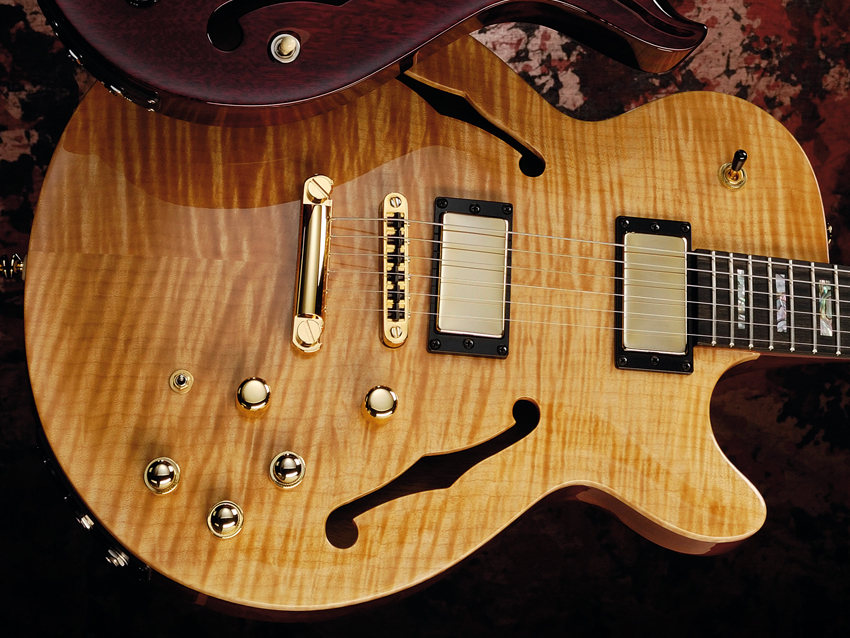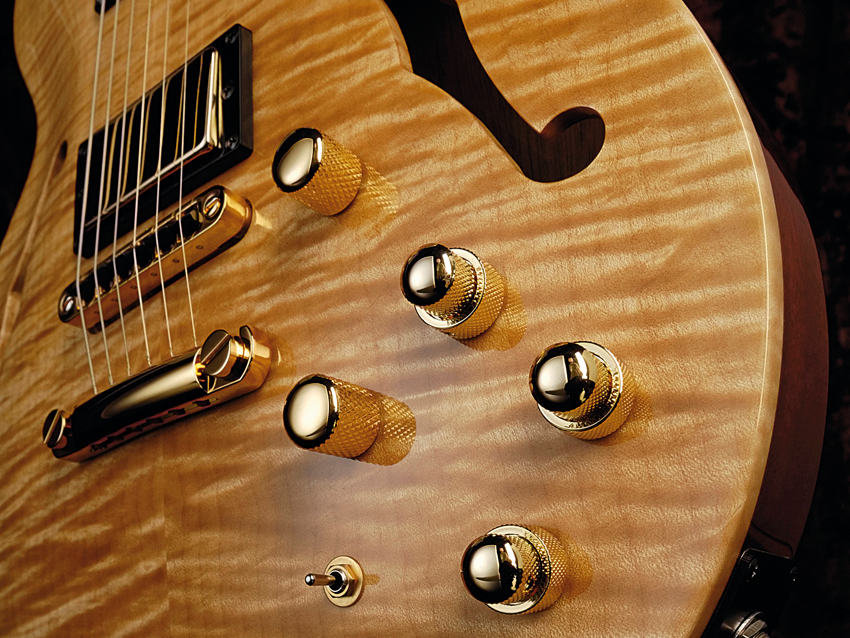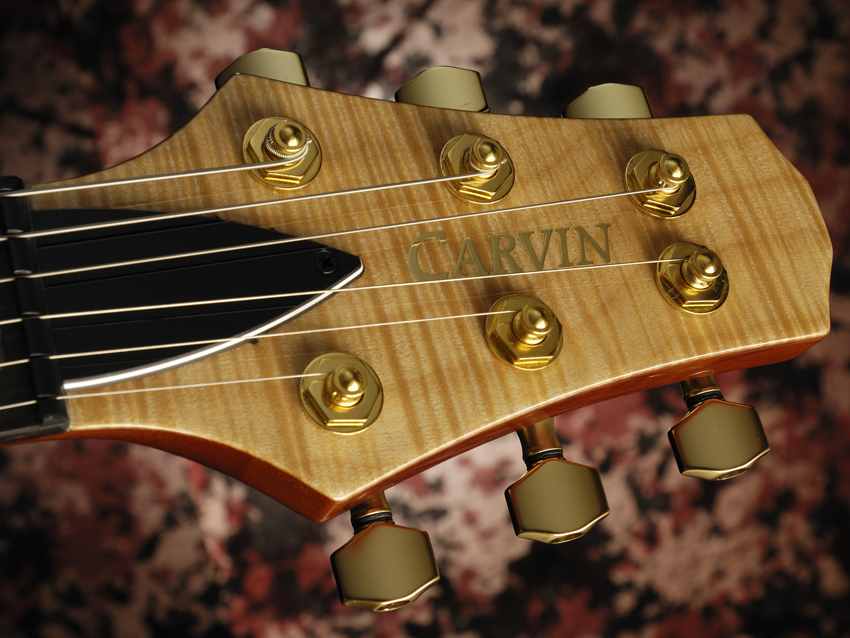MusicRadar Verdict
A very good electric guitar indeed that, even with full retail mark-up, would still be great value. At the direct price it's a bargain, although we'd go for the magnetic-only SH550. Less is more.
Pros
- +
Good solid build; excellent magnetic sounds; extensive options; price.
Cons
- -
We dislike: The piezo system is thin and rather noisy; no mag/piezo mono mix output.
MusicRadar's got your back

Carvin SH575

Carvin SH575

Carvin SH575
The back is made from a large slab of one-piece mahogany routed out to leave quite a complexly carved centre section, that doesn't run the full length of the guitar but stops after the tailpiece.
The back surface is flat with a generous edge chamfer but no comfort contouring. The top, made of centre jointed, richly figured and book-matched maple, is well carved with a good violin-like dishing and no binding.
The heel is rounded while the mahogany neck's full width fits into the body, PRS-like, with a tongue that extends under the neck pickup. The finish is exceedingly well done.
The neck is a flat-backed 'D', slightly thinner in depth than some others, but in its own way just as well shaped and including a strengthening volute behind the truss rod access hole - the weakest point of any neck.
An ebony 'board holds 22 frets. Each one of the cleanly inlaid abalone blocks is a virtual Impressionist painting - far from classic but, along with the gold-plated hardware, they give the SH575 a high boutique-like bling factor enhanced by the maple facing and gold Carvin logo on the approximately eight-degree back-angled, three-a-side headstock.
With its dual humbuckers, shoulder-placed three-way toggle and tune-o-matic-style bridge/ stud tailpiece set-up, it sticks to a Les Paul control layout, aside from the seemingly complex array of additional controls and sizeable side-plated socket plate that holds two 6.4mm jacks and a 13-pin DIN.
Not only do we have piezo saddles, courtesy of Graph Tech's Ghost system, but also synth access. Powering for the circuitry - a single 9V block - is rear-placed and accessed via a flip-top lid: simple but very effective.
Sounds
Two outputs, but no mixed mono mode, which means you either send the piezo to an acoustic amp or PA, or the magnetic into your guitar amp: you can't mix both together through one amp. It's a shame because that treatment can work well for jazzier or textural voices.
The controls are complex with standard volume and tone rotaries for the magnetics, then three stacked knobs: piezo volume/MIDI volume, mid-range frequency/mid-range cut and boost, and treble cut and boost/ bass cut and boost.
Auditioning the piezo output (we're not testing the synth access here), you're met with a noticeable - we'd say intrusive - background hiss that's primarily coming from the treble EQ; even fully cut you can still hear it and it means you can't really boost the treble.
Not that you'd want to - this system is more than bright and zingy enough. Still, with some tweaking there's a good enough range of more 'solidbody' piezo acoustic sounds although they contrast quite dramatically with the thick and rich magnetic sounds - as though the actual guitar is playing little part in the piezo sound, more the string.
Heavier ropes would help and while a little more fullness can be achieved with some outboard compression, it sounds a little synthetic. Running both systems through two amps, the piezo adds texture, although for nailing an accurate flat-top acoustic sound it misses the mark.
As for the magnetic sounds, there's a firmness and balance to the bridge pickup that's not overly mid-range heavy; strong but not overly hot.
It certainly creates a solid, rocking voice with some light gain. The neck pickup seems well balanced and again, while having a smoother darker voice, retains that really classic PAF-y tonality.
There's a roundness to the highs that is not dull, but quite smooth, and they clean up nicely with volume reduction.
The coil-splits, again, are what you'd expect: the lower output, thinner tones with the neck split are full of character and clarity, offering a really good blues voice, while the mix is nice and chiming and the bridge twangin' but not overly thin.
Guitarist is the longest established UK guitar magazine, offering gear reviews, artist interviews, techniques lessons and loads more, in print, on tablet and on smartphones Digital: http://bit.ly/GuitaristiOS If you love guitars, you'll love Guitarist. Find us in print, on Newsstand for iPad, iPhone and other digital readers
“A synthesizer that is both easy to use and fun to play whilst maintaining a decent degree of programming depth and flexibility”: PWM Mantis review
“I feel like that song had everything we needed to come back with”: Bring Me The Horizon’s Lee Malia on Shadow Moses, its riff and the secrets behind its tone, and why it was the right anthem at the right time
“I said, ‘Are we sure we can write a song about death?’”: The story of Mike + The Mechanics' classic No.1 The Living Years










